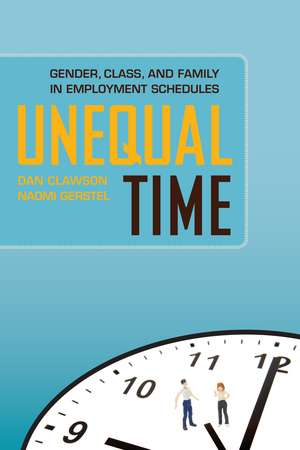Unequal Time: Gender, Class, and Family in Employment Schedules
Autor Dan Clawson, Naomi Gerstelen Limba Engleză Paperback – 9 iul 2014
Life is unpredictable. Control over one’s time is a crucial resource for managing that unpredictability, keeping a job, and raising a family. But the ability to control one’s time, much like one’s income, is determined to a significant degree by both gender and class. In Unequal Time, sociologists Dan Clawson and Naomi Gerstel explore the ways in which social inequalities permeate the workplace, shaping employees’ capacities to determine both their work schedules and home lives, and exacerbating differences between men and women, and the economically privileged and disadvantaged. Unequal Time investigates the interconnected schedules of four occupations in the health sector—professional-class doctors and nurses, and working-class EMTs and nursing assistants. While doctors and EMTs are predominantly men, nurses and nursing assistants are overwhelmingly women. In all four occupations, workers routinely confront schedule uncertainty, or unexpected events that interrupt, reduce, or extend work hours. Yet, Clawson and Gerstel show that members of these four occupations experience the effects of schedule uncertainty in very distinct ways, depending on both gender and class. But doctors, who are professional-class and largely male, have significant control over their schedules and tend to work long hours because they earn respect from their peers for doing so. By contrast, nursing assistants, who are primarily female and working-class, work demanding hours because they are most likely to be penalized for taking time off, no matter how valid the reasons. Unequal Time also shows that the degree of control that workers hold over their schedules can either reinforce or challenge conventional gender roles. Male doctors frequently work overtime and rely heavily on their wives and domestic workers to care for their families. Female nurses are more likely to handle the bulk of their family responsibilities, and use the control they have over their work schedules in order to dedicate more time to home life. Surprisingly, Clawson and Gerstel find that in the working class occupations, workers frequently undermine traditional gender roles, with male EMTs taking significant time from work for child care and women nursing assistants working extra hours to financially support their children and other relatives. Employers often underscore these disparities by allowing their upper-tier workers (doctors and nurses) the flexibility that enables their gender roles at home, including, for example, reshaping their workplaces in order to accommodate female nurses’ family obligations. Low-wage workers, on the other hand, are pressured to put their jobs before the unpredictable events they might face outside of work. Though we tend to consider personal and work scheduling an individual affair, Clawson and Gerstel present a provocative new case that time in the workplace also collective. A valuable resource for workers’ advocates and policymakers alike, Unequal Time exposes how social inequalities reverberate through a web of interconnected professional relationships and schedules, significantly shaping the lives of workers and their families.
Preț: 326.40 lei
Nou
Puncte Express: 490
Preț estimativ în valută:
62.46€ • 65.37$ • 51.98£
62.46€ • 65.37$ • 51.98£
Carte indisponibilă temporar
Doresc să fiu notificat când acest titlu va fi disponibil:
Se trimite...
Preluare comenzi: 021 569.72.76
Specificații
ISBN-13: 9780871540140
ISBN-10: 0871540142
Pagini: 340
Dimensiuni: 152 x 229 x 33 mm
Greutate: 0.53 kg
Editura: Russell Sage Foundation
Colecția Russell Sage Foundation
ISBN-10: 0871540142
Pagini: 340
Dimensiuni: 152 x 229 x 33 mm
Greutate: 0.53 kg
Editura: Russell Sage Foundation
Colecția Russell Sage Foundation
Recenzii
“How long is the workday, and how thick the paycheck? To these questions, scholars have offered answers. But the key questions, Dan Clawson and Naomi Gerstel propose in this fascinating book, are: how shielded are we from unpredictable demands? And how do we control the unpredictability we’re made to face? Comparing doctors, nurses, EMTs and nursing assistants, men and women, the authors explore the lives of the ‘haves’ and ‘have-nots’ of such control, as well as the friends, co-workers and family on whom they call to create orderly lives in an increasingly disorderly world. A thought-provoking and very important read.”
—Arlie Hochschild, professor emerita, University of California, Berkeley
—Arlie Hochschild, professor emerita, University of California, Berkeley
“Unequal Time is a meticulously and creatively researched study of how time at home and work is understood and managed. Time is not only an individual possession, but is relational. ‘Normal unpredictability’ rules. Dan Clawson and Naomi Gerstel explore the gaps between the rhetoric and realities of workplace flexibility. They find that flexibility is not just a matter of choice, but power.”
—Robert Aronowitz, M.D., professor and chair, History and Sociology of Science,
University of Pennsylvania
—Robert Aronowitz, M.D., professor and chair, History and Sociology of Science,
University of Pennsylvania
“Dan Clawson and Naomi Gerstel provide a powerful account of how inequalities are at the core of many of the vexing problems of work and family. Based on in-depth multi-method research in the health care industry, and this compelling book will change the way you think about work time issues. Essential reading for scholars and practitioners alike.”
—Juliet Schor, professor of sociology, Boston College
—Juliet Schor, professor of sociology, Boston College
Notă biografică
DAN CLAWSON is professor of sociology at the University of Massachusetts, Amherst. NAOMI GERSTEL is Distinguished University Professor in the Sociology Department at the University of Massachusetts, Amherst.
